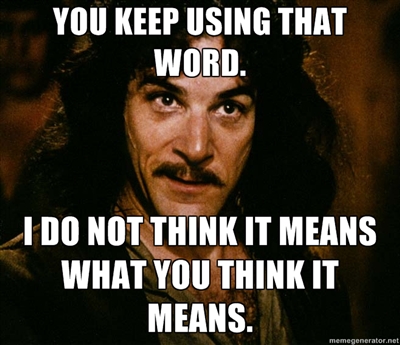On Facebook, a fellow I’ll call “Billy” recently decided to school me on what he imagines are the many logical fallacies in my podcast 189 – The unfinished business of the Reformation, a version of which has now been published in the conference proceedings by a German academic publisher.
Ok, I’ve finished watching your presentation, and below is my careful critique of it. Note that I’ve used “O’ = Objective, following your own abbreviation scheme. Enjoy.
In the presentation “O” stands for “Observation.” This is not a good sign! Will I enjoy?
O1 (~13-14:30): Among others (see also O2 below), you succumb to a fallacy of informal logic known as argumentum ad ignorantiam within this objective, aka the “argument from ignorance” logical fallacy, i.e., “there is no evidence of X, therefore….” For more information on this fallacy, see the following link: https://en.wikipedia.org/wiki/Argument_from_ignorance

Sorry, but you misdiagnose a fallacy here. There’s no mistake in this sort of reasoning, as explained roughly in minutes 7-12. We employ this sort of reasoning all the time, in both scientific and everyday scenarios. The form of reasoning I employ regarding Observation 1 is not : “There’s no evidence for P, therefore not-P” or anything like that.
O2 (14:30-16:25): I agree with the first part of your discussion here, and with Larry Hurtado. However, your conclusion in this objective is fallacious due to your a priori definitions containing too few potential resultants, i.e., only “U”, “T” or “C”, as you’ve defined those. And this criticism applies to O1 above as well, and in fact (by logical necessity) to all of your other “Os” that follow. (In professional science, we fondly refer to this phenomenon as “Garbage In, Garbage Out”, or GIGO for short). More technically in name though, you’ve succumbed here and everywhere within the presentation to the logical fallacy of “false dilemma”, simply because there are also other result-related alternatives. For more specifics on this fallacy, see the following link: https://en.wikipedia.org/wiki/False_dilemma
Again, you don’t understand the reasoning. The argument is not of this form: A or B, not-A, therefore B (Where clearly A and B are not the only options – it might also be C or D etc.) Rather, we’re looking at facts and seeing whether they favor some hypotheses over others. You’re free to throw in fourth and fifth hypotheses if you like; that there can be other hypotheses doesn’t affect our comparison of the three hypotheses here (U, T, or C) using the Likelihood Principle.
So for example, at a minimum, instead of “C”… I’d suggest you’d have done better to include options like “B” (for “Binitarianism”) and also say, maybe an “M” (or “X”) to signify “more than three”, e.g., for anyone who might regard additional Divine hypostases, meaning those beyond Son and Holy Spirit (see Heiser’s multiple lectures for a number of other potential candidates) as additional possibilities for distinctly identifiable hypostatic aspects of the Godhead. Thus in this Objective [he means “Observation”] 2, if you had just included B = “Binitarianism” as another potential outcome option, then “B” would be much more likely than “U”. In this important sense, you therefore also succumb to the “straw man” informal logical fallacy throughout this presentation, based on your straw-man assumption that any believer who isn’t a Unitarian must either be a creed-style Trinitarian or “confused”. That’s a false assumption, and ergo a straw man.
Do we really want to say that the New Testament authors are binitarian, thinking that God is bipersonal, composed of (only) God the Son and God the Father? This, on the face of it, would be a bummer both for trinitarians and for unitarians, as it is logically incompatible with both of those views. Why would we want to see how that hypothesis stacks up against T, U, and C – each of which has plenty of scholarly and lay proponents?
Billy doesn’t seem to understand what a “straw man” fallacy is. (I’ll let him go to Wikipedia to fix that.)
Also, in this presentation I’m not assuming that “any believer who isn’t a Unitarian must either be a creed-style Trinitarian or ‘confused.'” Again, those aren’t categories of people, a classification meant to be exhaustive – rather, those are just three hypotheses about the views of the New Testament authors.
So far our friend Billy has just gone on a spree trying to pin informal fallacies on me; this is not recommended when dealing with (present or former) professional philosophers. But his “critique” continues,

O3 (16:25-19:00): I have no problem with your logic here.
Of course you don’t, as Observation 3 is less of a problem for your theory. But the form of reasoning is exactly the same as with all the other Observations! Billy, this is not how one evaluates the reasoning in a presentation: to howl “fallacy” when the reasoning seems to hurt your side and to say “that’s all well and good” when it seems not to hurt your side.
O4 (19:00-19:55): Logically, this one is also subject to the criticism that it meets the criterion for an “argument from ignorance” fallacy (see O1 critique above).
Sorry, this is again a beginner’s mistake. Not observing something, or observing the lack of something, can be important to confirming and disconfirming theories. I’ll let you supply your own examples here – say, from medicine or criminal investigations, or some branch of science your’e familiar with.
With that stated though, if not intellectually, I’m at least spiritually more sympathetic to this one than to O1. But it nonetheless still falls victim to the “false dilemma” logical fallacy (see O2 critique above), due again to your a priori definitions containing too few potential resultants. So also in this one, if “B” = “Binitarianism” had merely been one possible outcome, then your premise here would fail just due to the existence of a passage like, e.g., Colossians 2:8-9.
There can be no false dilemma in the presentation because I have nowhere said or assumed that U, T, and C are the only possible explanations for these Observations. I’ve just not discussed something you evidently want to hear about.
O5 (19:55-20:28): Again, choice “U” would be supplanted here by “B” merely if “B” had also been included as one of your potential resultants.

“Resultants”? I don’t think that word means what you think it means.
And this also brings up another concept of logic borrowed from the philosophy of science known as “falsifiability”.
Oh do tell.
Specifically, those “17 times” that you mention within this one (or “8 times” or whatever it actually is) are all “black swans” for your “Unitarianism” claim. And all that it takes to refute that claim, logically speaking, is the existence of just one of those “black swans”. See this link for the related logical background: https://en.wikipedia.org/wiki/Falsifiability
Bro, this is just a word salad. I take stab at what you have in mind with the black swans example below.
O6 (20:28-21:05): FWIW (personally I think not much), this is one of your “stronger” arguments. However, it too has at least one black swan, which is Matt. 22:43-46, wherein Jesus is also quoting Psalm 110:1, a passage that you yourself also mention later in your O8.
Well, thanks, but it is unclear why you suppose that this passage in Matthew is relevant to Observation 6, which is that in the New Testament theos nearly always refers to the Father, rarely to the Son or Spirit, and never to the Trinity.
O7 (21:05-21:40): No issue with the logic here other than that the conclusion is too simplistic in light of scriptures like Colossians 2:8-9.
I’m starting to see a pattern here. Let’s look at that passage:
See to it that no one takes you captive through philosophy and empty deceit, according to human tradition, according to the elemental spirits of the universe, and not according to Christ. For in him the whole fullness of deity dwells bodily…
Colossians 2:8-9, NRSV
Just as I suspected. This passage has nothing whatever to do with Observation 7, which is the New Testament usage of phrases like “God and ___” and “God the ___”. Nor is the conclusion here, about the various probabilities of this observation assuming the truth of T, U, or C – any more or less “simplistic” than with the other observations.
O8 (21:40-22:30): Again no problem with the logic here other than just to mention again that if “B” had been included as a potential outcome, then again it would be more likely here than either “T” or “U”.
Not clear here that B would come out better than U. Can you see why?
O9 (22:30-24:27): I’d classify this one as falling under the fallacy that Heiser pointed out of over-emphasizing “proof texting”. See my earlier comment to Aaron and yourself regarding that, i.e., that comment to which you replied ad hominem. Moreover, in your discussion here in O9, you also simply ignore at least one “big reveal” (as you call it) that completely contradicts your view, i.e., John 20:28. And under the falsifiability criterion noted above, all it takes is just that one “black swan” to falsify your claim.
About your “black swan” example, that’s a famous example of the fallibility of inductive reasoning. Swan 1 is white, Swan 2 is white… Swan 100,000 is white, etc. – so we conclude (by inductive reasoning) that ALL swans are white. And then we eventually find a species of black swans. D’oh! (This really happened.) But the reasoning in this presentation is not induction, but rather abductive reasoning, a.k.a. inference to the best explanation. The argument of this presentation just isn’t easily torpedoed by someone’s favorite text.
About John 20:28, it’s not a problem for my theology, when you interpret that verse in the context of the rest of the book. In brief, it’s meant as a double confession, of the one Lord (Jesus) and the one God who is working in him, somewhat like 1 Corinthians 8:4-6.
By the way, just saying “What about this verse?” isn’t a very effective objection to this style of argument. Do you see why?
O10 (24:27-24:46): Not always. See Heiser’s materials for specific contradictions [he means counterexamples]. Possibly you just hadn’t viewed Heiser’s materials yet before you delivered this presentation in 2017?
I am and was aware that there are arguably exceptions to this rule. However, that it’s an overwhelming rule with few exceptions is enough to make the point. Do you see why?
O11 (24:46-26:41): John 20:28 would again comprise a sufficient “black swan” counter-example, and there are also other such counter-examples within Heiser’s lecture materials as already provided, if you care to look.
No, John 20:28 is not an example of the phenomenon described. Does Dr. Heiser actually discuss other cases? I don’t know. I would be interested to see these examples if he does. These are not cases just of some word like “Lord” or “God” applying, in various places, to both God and Jesus; see the examples given for would counts as examples of stylistic name-swapping.
O12 and O13 (26:41-28:50): These two by far comprise the worst and intellectually most careless sections of your lecture. Your entire premises within both sections are directly contradicted by Revelation 22:12-13: “And, behold, I come quickly; and my reward is with me, to give every man according as his work shall be. I am Alpha and Omega, the beginning and the end, the first and the last.” (See especially verse 13). And note that it is clearly Jesus who is doing the talking there, not “God the Father”. Hello?
Why would you think that Revelation 22:12-13 asserts or assumes the eternality of the Son? I take it that uniqueness is being asserted there, not eternality or timelessness. At any rate, you’re again missing the point. Let me grant that that text assumes that the Son is eternal. Notice that no passage in the New Testament, not even this one, read in the way you insist, seems concerned to assert the eternality of either Son or Spirit. This, in light of many centuries of trinitarian arguments since the mid 300s, is most surprising, if the New Testament author are trinitarians. But it’s not surprising at all if they’re unitarians – as with most of the other facts discussed here.
About O13: Unqualified implications of limits on the Son – Revelation 22:12-13 has nothing to do with that evidence. You just choose to skip over those passages.
O14 (28:50-30:05): See Heiser’s materials within the “Jewish Trinity” video… wherein he deals with the Shema in detail.
Naturally, I’ve seen and thought about that presentation. I don’t see how it’s relevant to O14, though. Feel free to enlighten me. Your’e doing a bang-up job so far!
O15 (30:05-31:27): More “proof texting”, and including John 17:3 again, as already addressed in one of my earlier comments. Understand too that there is no inherent logical contradiction, except maybe within certain human brains that are simply incapable of grasping the concept, of one hypostasis of God addressing himself as God within a second or third person grammatical construct.
Billy, when someone has a thought out position, you should be cautious about throwing accusations of mindless “proof texting.” I suspect you’re not feeling the force of O15 because like many apologetics aficionados, you don’t understand the logic of identity. It’s possible that this post and podcast or this one may help you to understand why the passages I cite in O15 are not what a trinitarian should expect to find. If you’re willing to put in some work, this will go more into the technicalities, the sorts of machinery you’d learn to use in a college class on modern logic.
By the way, this is not about my claiming that there is some “inherent logical contradiction” in “the Trinity” – notice that there are no such claims in this presentation. Nor is it assumed that God can’t address himself in various “Persons,” whatever that may amount to.
Folks, PhDs are humans too and are wrong – sometimes terribly, tragically wrong – about all sorts of things, but when someone is a PhD in Philosophy, and he gives a presentation in front a room full of PhDs and, and as best you can tell no one there busted him out for a bunch of stupid mistakes in reasoning – it is unlikely that you and your sidekick Wikipedia are going to unmask a tragic parade of errors in reasoning.
Compare with this case: you hear a presentation by a physicist, and in your great wisdom you determine it’s riddled with basic errors in Algebra. Frankly, for an average person, even if you’ve brushed up on Algebra with help from Wikipedia, it’d be stupid and arrogant in a case like that to stand up and accuse the physicist of a bunch of mathematical blunders. Just so in the present case, with a philosopher and logical fallacies. Apologists, if you are training laypeople to idiotically correct experts in their fields of expertise, you are doing it wrong.
Billy’s energy would have been better spent understanding how the Likelihood Principle is applied, considering the meaning and significance of the Observations discussed, and whether he really wants to urge that the New Testament authors are really binitarians.

Billy’s response? A holier-than-thou cop-out. In its entirety: “The purely spiritual aspects of the responses you put on your blog post speak for themselves.”
Comments are closed.